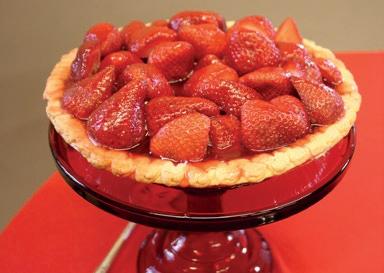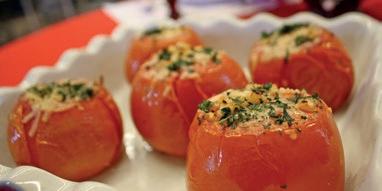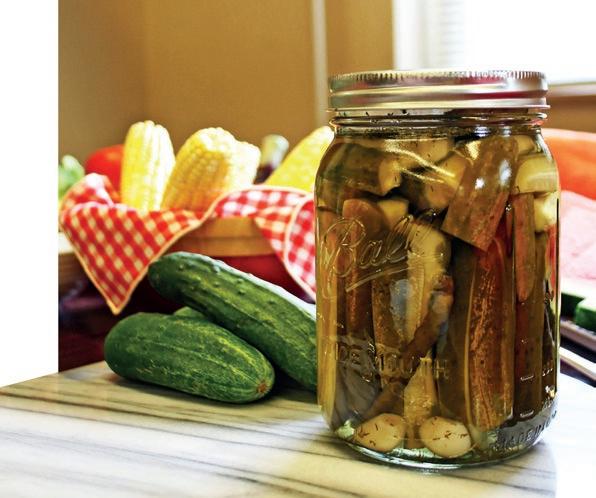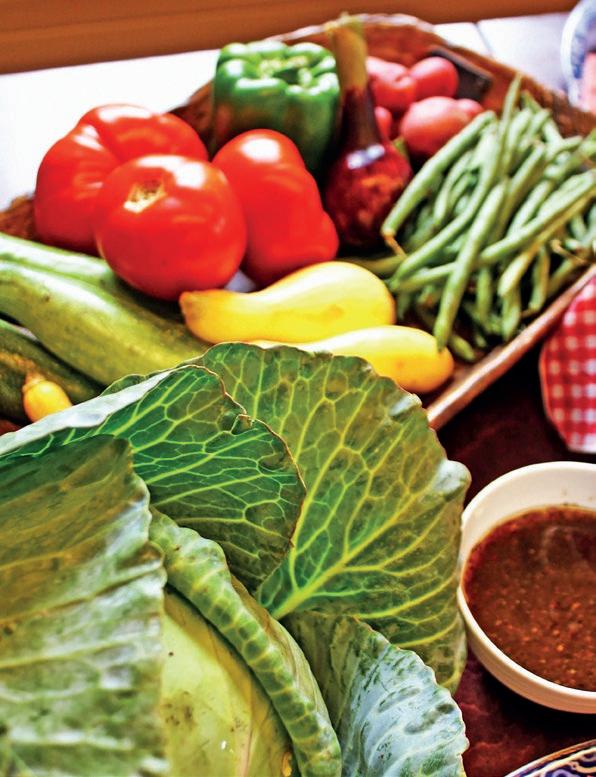
6 minute read
Embracing nature’s bounty
Katernia Cole-Coffey County Extension
Nature’s bounty Embrace summer season’s plentiful produce
Advertisement
Story and photos by ALISON JAMES
With long summer days returns an abundance of fresh, locally-grown fruits and vegetables that so many miss during the winter months. Franklin County Extension Director Katernia Cole-Coffey is a strong advocate for this summer splendor, for adding a hearty variety of healthy homegrown produce to one’s diet – and that doesn’t just mean tossing a boring old salad.
“Veggies are good for the body, for overall health. They provide fiber, vitamins A and C, potassium and folic acid, and it’s a good way to eat light. Sometimes our meals can be a little bit too heavy,” Cole-Coffey explained. “Fresh fruits and vegetables are very refreshing, and if you combine a lot of them, you can get a lot of nutrients you need in order to be healthy. Most vegetables are naturally low in fat and calories – and no cholesterol, unless you add different seasoning and fat.”
Cole-Coffey said she encourages choosing delicious and inviting ways
to add vegetables to one’s menu, like a tantalizing summer watermelon salad – spring mix jazzed up with watermelon, red onion, English cucumbers, basil and a balsamic vinaigrette dressing – or a tempting plate of of tasty oven-roasted tomatoes. Garden vegetable sandwiches are another yummy option. “For a different twist on tomato and cucumber sandwiches, spread garden cream cheese spread on bread instead of mayonnaise,” Cole-Coffey recommended. “Add different spices and seasonings to make the flavor pop.” Fruit smoothies are another option and a great way to get children to welcome more healthy choices into their diets.
Although summer is peak season for many of the most-loved fruits and veggies, Cole-Coffey said people shouldn’t discount the many ways to preserve them for enjoyment year-round, from canning and pickling to freezing. Squash pickles are favorite for ColeCoffey, along with homemade jams.
Oven Roasted Tomatoes
3 lbs. tomatoes 1 tablespoon olive oil 1 teaspoon minced garlic 1 tablespoon basil 2 tablespoons parmesan cheese
Salt and pepper to taste
1. Preheat oven to 450 degrees. 2. Wash tomatoes and cut them in half. 3. Toss tomatoes in oil top with garlic, basil, salt, pepper and parmesan cheese. 4. Place in baking dish and roast to desire doneness, about 15 to 20 minutes.

Refrigerator Dills Makes about 5 quarts
6 pounds pickling cucumbers 3/4 cup pickling salt 18-24 large heads of fresh dill weed 2-3 garlic cloves, peeled and sliced 1 1/2 gallons water 6 tablespoons mixed pickling spice
1. Use 4-inch cucumbers. Wash them well. 2. Cut a 1/16-inch slice from blossom ends and discard. Leave a 1/4-inch stem attached. 3. Place cucumbers in a 3-gallon fermentation container. Add dill. 4. In a large pot, combine water, salt, garlic and pickling spices. Bring to a boil. 5. Cool and pour over cucumbers in container. Cover with a plate and weight it. 6. Keep it at 70-75 degrees for one week. 7. Then, fill jars with pickles and cover with pickling liquid. Close jars securely with lids and store in the refrigerator. 8. Pickles may be eaten after three days and should be used within two months.
Tomato Juice Drink

1 cup tomato juice 1/2 tsp. lemon juice celery salt to taste black pepper to taste garlic powder to taste dash hot sauce dash Worcestershire sauce 1/2 cup ice 1 celery stick for garnish
1. In a glass add tomato juice, lemon juice, celery salt, pepper, garlic powder, hot sauce and Worcestershire sauce. Mix well. 2. Pour over ice. 3. Garnish with celery stick.
Strawberry Jam
Makes about 4 half-pints
2 pounds strawberries 3 cups sugar
1. Wash berries and remove caps. 2. Crush berries in a large, thick-bottom saucepan and add sugar. 3. Heat slowly to a boil, stirring occasionally until sugar dissolves. 4. Then, increase heat and boil rapidly until mixture is thick, stirring frequently to prevent sticking. 5. Fill hot jars immediately with jam, leaving a 1/4-inch headspace. Remove air bubbles. 6. Wipe jar rims and adjust lids. 7. Process in a boiling water-bath canner: half-pints, five minutes, or pints and quarts, 10 minutes.
Peach Pineapple Butter Makes about 10 half-pints
5 pounds peaches 1/4 cup bottled lemon juice 2 cups drained unsweetened crushed pineapple 2 cups sugar, or to taste
1. Use firm, ripe peaches that have no evidence of insect or disease damage. 2. Wash peaches and dip in boiling water for 30-60 seconds until skins loosen. 3. Dip quickly in cold water and slip off skins. 4. Cut peaches in half and remove pits. 5. Grind peaches in a food processor, using a medium or coarse blade or crush them with a fork or potato masher. Do not use a blender. 6. Place pulp in a large, thick-bottom saucepan and heat over medium heat. 7. Stir constantly until peaches are tender. 8. Place pulp in a jelly bag or a strainer lined with four layers of cheesecloth. Allow juice to drip about 15 minutes. Save the juice for later use. 9. Measure 4 cups of the drained pulp into saucepan. 10. Add the pineapple, lemon juice and sugar and mix well. 11. Heat to a boil over medium heat and boil gently, about 10- 15 minutes, stirring enough to prevent sticking. Cook until butter is thick and has taken on a glossiness or sheen. 12. Fill hot jars immediately with the butter, leaving a 1/4-inch headspace. Remove air bubbles. Wipe jar rims and adjust lids. 13. Process in a boiling water-bath canner: half-pints, 15 minutes, or pints, 20 minutes.

Notes:
Non-nutritive sweeteners may be used. If aspartame is used, its sweetening power might be lost within 3 to 4 weeks.
For variations, use any combination of peaches, nectarines, apricots and plums.
Pickled Pepper Onion Relish
Makes about 9 half-pints 3 cups finely-chopped sweet red peppers 1 1/2 cup sugar 3 cups finely-chopped green bell peppers 6 cups white vinegar (5 percent acidity) 6 cups finely chopped onions 2 tablespoons pickling salt
1. Combine all ingredients in a large pot and boil gently about 30 minutes or until mixture thickens and volume is reduced by one-half. 2. Fill hot jars with relish, leaving a 1/2-inch headspace. Remove air bubbles. 3. Wipe jar rims and adjust lids. 4. Process in a boiling water-bath canner: half-pints, five minutes. 5. Note: Jars of relish that will be used within one month do not need to be processed. Simply cover them securely with lids and store in the refrigerator.


Not sure how to add a little extra pizzazz to your fruits and veggies? Try these seasonings for a tasty upgrade:
• Fruit: allspice, cinnamon, cloves, curry, ginger, mace, mint, nutmeg or pepper • Broccoli: mustard, nutmeg or sage • Carrots: dill, nutmeg, parsley, rosemary or thyme • Cucumbers: basil, dill, parsley or everything bagel seasoning • Eggplant: oregano or parsley • Mushrooms: garlic and sage • Peas: marjoram or mint • Potatoes: chives, cumin, dill, fennel, garlic, mace, rosemary or tarragon • Squash: ginger or nutmeg • Tomatoes: allspice, basil, cloves, cumin, fennel, marjoram or oregano • For watermelon or cucumber with a new twist, try sprinkling with Tajín Clásico seasoning, a chili lime blend made with mild chili peppers, lime and sea salt.

Ditch the plastic plates this summer and make each meal feel special with just a little extra attention to detail. Cole-Coffey recommends instead of “saving” those beautiful dishes and serving pieces, use and enjoy them! A red, white and blue color palette is a popular, patriotic theme for summer gatherings around the table.







